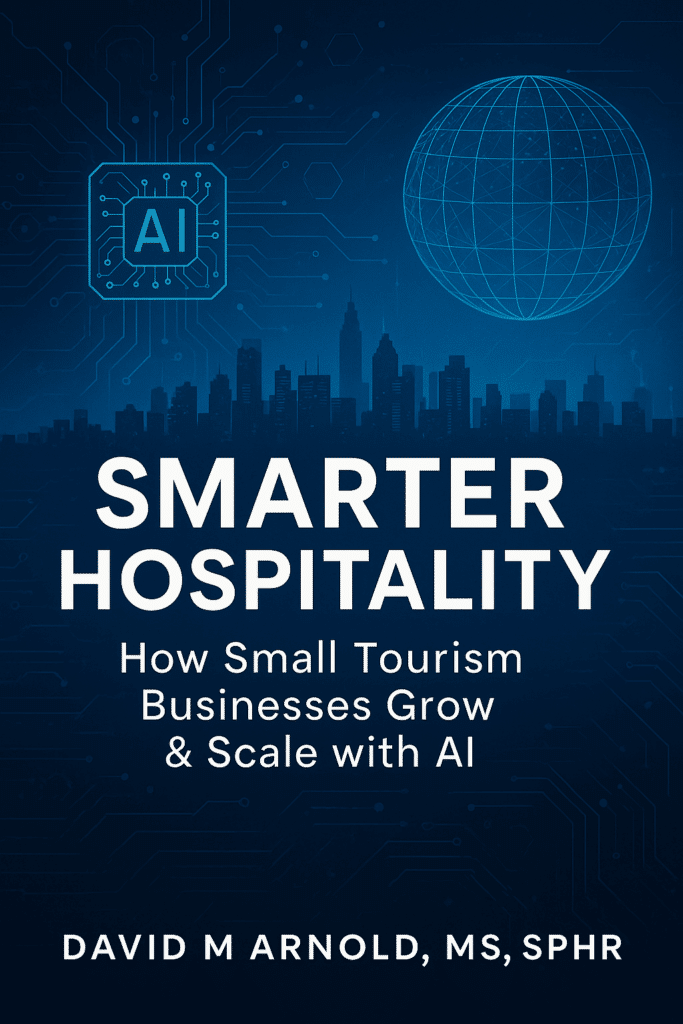Introduction to AI in Hospitality and Tourism
The hospitality and tourism industries are in the midst of a tech-driven revolution, and at the forefront of this transformation is artificial intelligence. From personalized guest experiences to streamlined operations, AI in hospitality is no longer a futuristic concept—it’s today’s competitive advantage. Business owners, hotel managers, and tourism professionals are discovering that AI isn’t just about robots or automation; it’s about understanding guests better, anticipating their needs, and delivering a level of service that exceeds expectations. In a world where customer experience is king, AI in hospitality is the crown jewel.
This article explores how smart technology is redefining every phase of the guest journey. We’ll dive into the ways AI is helping brands gain a competitive edge, how it turns guest data into actionable insights, its impact from pre-arrival to post-departure, and why now is the perfect time to invest. Whether you’re running a boutique hotel or managing a global tourism enterprise, this guide is your roadmap to leveraging AI in hospitality to its full potential.
Gaining the Edge: Why AI in Hospitality Is a Game-Changer for Modern Brands
In today’s experience-driven economy, differentiation is everything. Guests expect more than a bed and breakfast; they expect seamless service, instant gratification, and hyper-personalized attention. AI in hospitality allows brands to meet—and even exceed—these expectations with tools that adapt, learn, and improve over time.
AI-powered platforms can predict trends, optimize pricing strategies, automate repetitive tasks, and offer data-driven marketing solutions. These advantages translate into real-world benefits like faster response times, lower overhead costs, and higher customer retention rates. Chatbots, for instance, can handle guest inquiries 24/7, freeing up front-desk staff to provide in-person service where it counts most.
Predictive analytics powered by AI enables hotels and resorts to anticipate peak booking periods, adjust pricing dynamically, and allocate resources more effectively. This not only boosts revenue but also enhances the guest experience by minimizing friction and delays. As competition in the hospitality industry intensifies, early adopters of AI technology are setting themselves apart as innovators.
AI in hospitality is also helping brands tap into new markets. Language translation tools powered by machine learning break down barriers for international guests, while AI-driven personalization ensures every touchpoint feels tailor-made. Whether it’s remembering a guest’s preferred pillow type or suggesting activities based on past behavior, AI creates the kind of memorable moments that foster loyalty.
AI in Hospitality Guest Data Analytics: Turning Insights into Experiences
Data is the lifeblood of any successful hospitality operation, but it’s how that data is used that makes the difference. AI in hospitality takes raw guest data—booking patterns, online reviews, social media interactions, loyalty program activity—and transforms it into actionable insights that can significantly enhance the guest experience.
By leveraging machine learning algorithms, hoteliers can identify trends that would be impossible to detect manually. For example, if data shows that weekend guests are more likely to dine in-house, promotions or package deals can be strategically timed to increase revenue. AI tools can also segment guests based on behavior and preferences, enabling truly personalized marketing campaigns.
AI in hospitality also plays a crucial role in sentiment analysis. By scanning reviews, surveys, and social posts, AI can assess how guests feel about their stay in real-time. This empowers managers to respond quickly to negative feedback and reinforce positive experiences. It’s like having a 24/7 feedback loop that guides service improvements.
Furthermore, predictive modeling helps anticipate guest needs. If a frequent traveler always requests a quiet room and late check-out, AI ensures those preferences are automatically fulfilled on the next booking. This level of attention not only delights customers but also strengthens brand loyalty and boosts lifetime value.
With the right AI infrastructure in place, even small hospitality businesses can level the playing field with major hotel chains. AI democratizes data, giving all businesses access to the same analytical firepower that was once exclusive to global brands.
Download your FREE eBook today!
From Booking to Goodbye: The End-to-End Impact of AI in Hospitality
AI in hospitality doesn’t just make things easier for management; it transforms the guest experience from start to finish. From the moment a traveler begins their search for accommodation to the time they check out, AI is involved every step of the way.
During the booking process, AI helps guests find the right property through recommendation engines that match preferences with availability. Once a booking is made, automated confirmation emails, itinerary updates, and even pre-stay surveys are triggered, setting expectations and building excitement.
Upon arrival, facial recognition technology can streamline check-in, while mobile apps powered by AI allow guests to request services, unlock doors, and control room features like lighting and temperature. Virtual assistants can answer questions about local attractions, restaurant hours, or spa appointments, delivering concierge-level service instantly.
During the stay, AI systems track behavior and preferences, adapting the environment in real time. For example, if a guest frequently uses the gym, AI might suggest fitness classes or offer personalized nutrition options. All of this creates a sense of being understood and cared for.
Even after checkout, AI continues to engage. Automated thank-you messages, review requests, and targeted offers for future stays keep the relationship alive. These touchpoints are crucial for maintaining loyalty and increasing the chance of repeat business.
In essence, AI in hospitality redefines the guest journey by making it more intuitive, personalized, and seamless. It’s not just technology for technology’s sake—it’s a strategic tool for building stronger customer relationships.
Leveraging AI in Hospitality to Outpace Competitors in Guest Satisfaction
Guest satisfaction has always been the cornerstone of hospitality, but in today’s digital world, it requires more than friendly smiles and clean linens. AI in hospitality gives businesses the tools to elevate satisfaction through speed, personalization, and proactive service.
One of the biggest advantages of AI is its ability to provide instant responses. Whether a guest needs extra towels or has a question about local attractions, AI-powered chatbots and virtual assistants deliver immediate answers. This responsiveness increases satisfaction and reduces the workload on staff.
AI also helps identify service gaps before they become problems. By continuously analyzing data, AI can flag patterns—such as recurring complaints about check-in wait times or slow room service—allowing managers to address issues proactively.
Personalization remains one of the most powerful drivers of guest satisfaction. AI enables hotels to remember guest preferences, anticipate needs, and surprise customers with thoughtful touches. This could be as simple as greeting a guest by name or as complex as customizing a spa package based on past behavior.
Moreover, AI supports staff training and resource allocation. By understanding peak hours and guest flow, AI ensures the right number of staff are available at the right time, reducing wait times and enhancing service delivery.
Ultimately, businesses that embrace AI in hospitality are better positioned to deliver consistent, high-quality experiences. In an era where online reviews and social media can make or break a brand, exceeding guest expectations isn’t optional—it’s essential.
Investing in AI in Hospitality: What Every Business Owner Needs to Know Now
For hospitality and tourism business owners, the question is no longer if you should adopt AI, but how and when. The answer? Now. Investing in AI in hospitality is a strategic move that pays off through increased efficiency, higher guest satisfaction, and stronger financial performance.
The first step is identifying the areas of your operation that can benefit most from automation or data analysis. This could include front-desk check-ins, housekeeping schedules, guest communications, or marketing campaigns. From there, explore platforms and tools tailored to the hospitality sector.
Affordability is no longer a barrier. Many AI solutions are cloud-based and scalable, meaning you can start small and grow as needed. Whether it’s a chatbot for your website or an AI-powered CRM system, there’s a solution for every budget.
Training is also critical. Ensure your staff understands how to work alongside AI tools. Far from replacing jobs, AI in hospitality enhances human capabilities, freeing employees to focus on empathy-driven, high-value tasks.
Data security and privacy should not be overlooked. Choose vendors who comply with international data protection standards and make transparency a priority.
The ROI on AI investments is compelling. Hotels using AI report improvements in operational efficiency, booking rates, and customer satisfaction. More importantly, they are building future-proof businesses equipped to adapt to changing guest expectations.
AI isn’t a trend—it’s the new normal. And those who invest wisely today will reap the rewards tomorrow.
Conclusion
AI in hospitality is no longer reserved for tech giants or futuristic concept hotels. It’s here, it’s real, and it’s reshaping guest experiences in ways that were once unimaginable. From smarter operations to personalized service, AI empowers hospitality and tourism brands to connect with guests more meaningfully and efficiently.
If you’re ready to take your hospitality or tourism business to the next level, the time to act is now. Contact CCAi365 at 252-668-1640 to see how AI can revolutionize your Hospitality and Tourism business. Embrace the future. Your guests will thank you for it.



